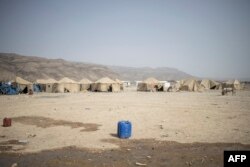Internally displaced persons in the Afar region of northern Ethiopia have left several camps due to lack of food and shelter. The United Nations has warned that returning home may not be any better and is calling for more international support.
Many were forced to flee their homes due to the battle between the Tigray Regional Forces and the Federal Forces and their allies. Others have devastated herds of livestock and fled the record drought that hungry millions of Ethiopians.
Myra Muhammed, a mother of three, walked 400 km in January to a camp in Dutti, northern Ethiopia, but was crowded with 30,000 internally displaced persons. There is not enough food and shelter in the camp and Muhammed is arguing whether to return to her home, but she and her family are not there to help either.
It's not just Muhammad.
Faraway disaster officials say at least 8,000 internally displaced persons returned home in June due to a shortage and closure of one camp.

According to the UN refugee agency, 12,000 internally displaced persons in the region have returned since March.
Idris Muhammad Abdullah, the local IDP reader for the Dubti site, said he was running out of resources and was slowly showing up. Assistance may or may not be available to 400 or 500 households at all, which causes conflict.
Russia's war against Ukraine has attracted worldwide attention from Ethiopia and pushed up the cost of food aid.
The United Nations Humanitarian Office in Ethiopia states that $ 3 billion is needed to meet the needs of IDPs, and those returning home could be exacerbated.
Michel Sard, Head of the Ethiopian Humanitarian Coordination Office, explains: There is no electricity, no banking system, no telecommunications. So obviously the situation remains very difficult.
Meanwhile, internally displaced persons in the camp are waiting for help in the heat — first distributed to the most vulnerable.
The mother of six refugees, Asia Hussein, received food, but she was not enough. "But what should I do?" She asked.
Currently, there are no good options for Ethiopians evacuated by war and drought.


